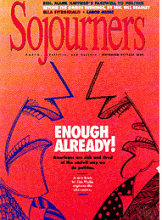The Atlanta Summer Olympics descended upon media-mad America like a vast mind-numbing, soul-sapping fog. The Olympic telecast, in any season, is like the Deep South heat so much discussed at the Atlanta games: It is there, and it won't go away. Mere mortals are powerless over it.
The other Leap Year staples—the Democratic and Republican political conventions—were once like this, too. The coverage was gavel-to-gavel and wall-to-wall for at least four days per party on all three networks; even political junkies got sick of it. Now the conventions get, maybe, an hour of prime-time per night. This is all part of an inexorable process that will lead to the banning of all not-for-profit activities by the year 2020.
The word from the sales department is that politics doesn't pay, at least not over the counter, in public. So the conventions are off the screen. There is no commercial payoff to Jefferson's ideal of an informed and enlightened electorate. Like all other values without price, that ideal is out the window in the Free Market Era.
The Olympic Games used to carry an aura of unsightly non-profit, touchy-feely ideals. The Games were inherited from the ancient Greeks. Every four years their best athletes climbed to the home of the gods, Mt. Olympus, to offer the finest of human performance.
The Games were revived at the turn of this old century with a lot of mush about international brotherhood and something called "amateurism." That was supposed to mean running the race or playing the game for the pure love of it. Excellence for its own sake and perfecting a skill simply for the joy of a job well done were suitable goals.
Read the Full Article
